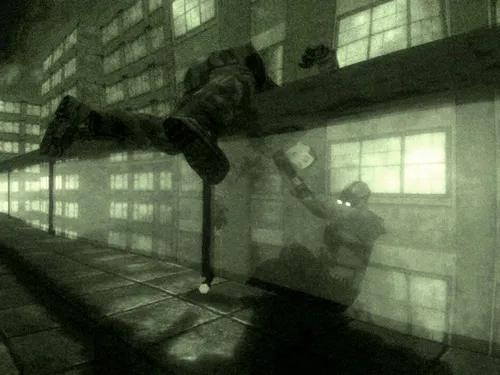Splinter Cell: Chaos Theory
Many claim that Chaos Theory is the pinnacle of the Splinter Cell series. It was also one of the very few games with pretty effective copy protection scheme, as a proper warez version did take an awfully long time to surface. In an ironic twist, the Splinter Cell: Conviction's always-on DRM scheme was broken pretty quickly in comparison. I originally missed this game because my then PC couldn’t handle this game at the time. Today, the tables have turned and the odd shading system in Pandora Tomorrow means no new system can run that.
Like Tom Clancy or Robert Ludlum novels, the plot in Chaos Theory gets complex and there’s conspiracies and what not. Also, the story seems to pick up where Pandora Tomorrow ended, so no time is wasted explaining what Masse kernels are and why they are dangerous. Practically this means only that you have no idea who are the bad guys, but fortunately that doesn’t make much difference as the whole point is getting unnoticed through levels. On the plus side, the game takes less time to play-through than to read through a novel by either of aforementioned gentlemen. It’s also much more interesting to use spy stuff than to read about them.
Just like in the the previous games, there are couple of levels of don’t-kill-anyone-or-it’s-an-instant-failure. Once again, doesn’t really change a thing unless your playing tactics are mostly about shooting everyone. I usually use the guns to shoot lights and other stuff in the environment, because what’s the fun shooting people when the designers have spent lots of time and effort giving me more interesting options.

This series is one of my favourites in the sneak-and-strangle-people-creatively with the Hitman: Codename 47 series. In Hitman, trying to accomplish the levels with Silent Assassin achievement is an exercise in coolness, Splinter Cell is mostly military-technology porn on tracks. Sure, there is a mission rating and additional bonus objectives, but those do not matter at all. Getting SAs in Hitman at least unlocked weapons – which of course you couldn’t use if you were aiming to SA the next levels as well.
Like in Hitman, you have generally couple of ways going around your mission in the levels. You can try to be as stealthy as you can or you can just blast your way, but it doesn’t really matter. Of course, someone could claim that’s what playing games is about - it’s not about optimizing your way within the rules of the game, but enjoying the process. There are a couple of decision points, but information about their existence or their consequences are minimal. But, once again, you’re not trying to prove anything to the game or the computer, so it’s just about you.
I found myself quickloading and saving not because of failing something, but because I didn’t do it in a cool enough manner. The downside is that quicksaving and loading does make the experience rather bite-sized and you don’t get the feeling of a momentum. It’s like playing Tony Hawk and quicksaving in middle of a combo. Playing through the story using quicksaving rather liberally took me 13 hours[1].
According to many, this game marks the end of the canonical Splinter Cell series. The next one in the series is Double Agent, where the writers couldn’t not kill Fisher’s daughter. It was inevitable, of course, but oh-so-fucking-unsurprising as she was at the mercy of whatever sequel writer who couldn’t come up with a fresh set of cold war enemies anymore. Like in any spy book infinitologies, the life expectancy of any of Fisher’s friends drops to zero as the series goes forward. Also, the “accident” where Fisher’s daughter was killed, in a serious non-twist of the plot, turns not to have been an accident at all in the latest game, Conviction. Unfortunately Splinter Cell: Conviction suffers from Ubisoft’s braindead DRM.
As a completionist, I will probably go and spoil the series by playing both Double Agent and Conviction at some point. The Splinter Cell series has been a lot of fun. The plot doesn’t really matter that much, because in this game series, you get to be a spy and kill bad guys in awesome ways. It’s perfect escapism for anyone who spends their days hunting calculation errors in Excel.
In short summary, it’s Splinter Cell. Quicksave and quickload! Like Hitman, rewards for thinking in advance about your routes. Also, lets you experiment with all the cool spy stuff.
As reported by Steam, but it does include taking the dog outside several times in between. ↩︎